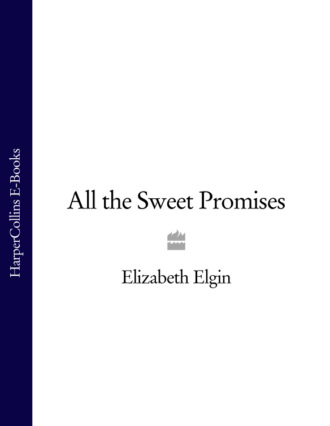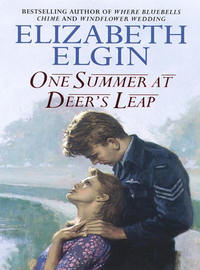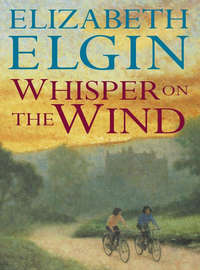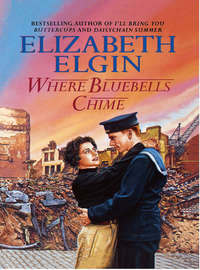
Полная версия
All the Sweet Promises
Two days ago, in this very room, Mama. Charlie got annoyed with me because I wouldn’t let him. Called me frigid and said all the other chaps’ girls were willing enough, and would it matter all that much if he put a bun in the oven for me? So I let him, Mama, right there on the sofa, and it wasn’t a bit nice, and in the end Charlie went off in a huff …
‘A couple of days ago? And what did he say? That boy will go off with someone else, mark my words.’
‘No he won’t. We’ll be married, I promise we will.’
And she hoped she would feel better about getting the baby everyone seemed to want so much. She wanted it too, and maybe when she and Charlie were married and in bed and they’d had a few drinks and she was wearing a black nightie, then maybe it wouldn’t be so bad.
‘Married! I wish I could be sure of that.’ Lady Kitty looked obliquely at her daughter. Lucinda was tall and beautiful, and most times obedient and biddable. It was a pity she was an only child; the fault of the riding accident, of course. Secretly, she had been grateful to the farmer who had strung barbed wire across that particular gate.
Kitty Bainbridge had not enjoyed her pregnancy, though she accepted that her family record had been taken into account when Donnington proposed. The Cravens were a prolific lot, wretchedly poor but very fertile. There had been eight of them, four girls and four boys, and only ten years between first and last. So Kitty Craven had been welcomed to Lady Mead, and the Dowager died happy in the knowledge that her daughter-in-law of six months was five months pregnant.
But the getting of that child was not the pleasurable romp she had been led to believe, and her pregnancy was a sick one. As for Lucinda’s birth – she still shuddered just to think of it, and she had prayed that the next one would produce the son she so desperately needed to enable her to call a halt to the whole disagreeable business. But fate intervened and the young Countess of Donnington was thrown from her horse and, badly cut and bruised, lay concussed for two days and nights.
Poor Kitty, everyone said, when she did not conceive again; thank goodness there’s a lesser Bainbridge to carry on the line.
Thank goodness indeed, poor Kitty agreed, and from then on Lady Lucinda, smiling in her pram, and her three-year-old cousin Charles, featured hugely in her future plans. And when they married, thought the Countess happily, the Bainbridge comforts would still be hers to manipulate, provided the Earl popped off first and, as he was fifteen years older, it was almost certain that he would.
‘Well,’ said the Countess, ‘are you to be out on the town again with your wounded soldiers?’
‘Well, they do rather want to take in a show, but we’ll have to see what’s open. Don’t worry, though. If there’s another raid and it gets bad, we’ll go to the nearest tube station. It’s safe enough down there.’
Kitty Bainbridge closed her eyes and shuddered. She had had enough of the blackout and the bombing and the shortages, and if she let herself think too much about the invasion she would become quite ill. It was all too much, waiting for that upstart Hitler to make up his mind; to envisage the Germans strutting down the Mall as they’d strutted down the Champs Élysées. And all because of Poland!
‘Oh, and could I please have the hot-water ration today, Mama? You did have it yesterday and Thursday too, and I must have a bath.’
‘Then you’ll have to take it standing up in cook’s enamel bowl.’ If they’d had a cook! If the wretched woman hadn’t taken herself off to war work in a factory canteen for three times the money, or so she had said. ‘They hit the mains last night with a land mine. No electricity for two days, the gas turned off too, and now no water. It’s beyond belief, it really is. I wonder sometimes what the world is coming to.’
Our world, Mama, Lucinda brooded. Yours and mine. It’s changing, but you won’t accept it. There are no servants now, no seasons in London or Monte, and our lovely, stubborn, precious little island might be invaded any day. France has gone, and Belgium and Holland, and the German army is only a few miles away across the Channel. I know why you are so jumpy, Mama, but you mustn’t think you are the only one who is being put out. This is everybody’s war; we are all suffering and we are all afraid …
‘Look, don’t get upset. It doesn’t matter about the bath.’ It was selfish even to think of one when the fire service needed every drop of water to douse the bombed, blazing buildings. She laid an arm around her mother’s shoulders. ‘You’re tired – everyone is. Why don’t you pack a bag and go to Cromlech? You’d be able to get some sleep up there and –’
‘Scotland? How can I go there? McNair’s living in Cromlech, or had you forgotten?’
McNair, the elderly gillie who had agreed to live as caretaker in the Earl’s shooting lodge. Lady Kitty had been furious, declaring that the man was arrogant enough without giving him licence to sleep in his employer’s bed and sit upon his lavatory.
‘It’s either the McNairs or a dozen bombed-outs from Clydeside, m’dear. Take your pick,’ came the bland retort. The Countess had settled for McNair.
‘Then how about Lady Mead? We’ve still got the Dower House, and Lincolnshire is lovely in May.’ So very lovely, Lucinda remembered.
‘My dear good girl, the Dower House is bursting at the seams with furniture, not to mention Nanny. Besides, there’s no petrol left till the next coupons are due, and I won’t go by train.’
‘Then mightn’t it help keep your mind off things if you took up war work? The WVS ladies are in the tube every night making tea when the sirens go. Or you could drive an ambulance.’
The Countess could not drive an ambulance. For one thing, she couldn’t see a thing in the blackout without her glasses; and for another, the uniform wasn’t half attractive enough. War work? Oh dear, no. It was enough with Donnington’s preoccupation with his Home Guarding and a daughter who thought more of wounded soldiers than she did of family duty.
‘No thank you! No need for us all to go in at the deep end.’
‘Oh, Mama, don’t make it more difficult than it already is. Do please try.’
But Mama would never budge. She had been completely against the war, right from the start. She was, dare her daughter think it, extremely selfish.
‘Look, darling, I got a hunting-pink lipstick yesterday and some rose-geranium soap. I’d hidden them away for your birthday.’ Not strictly true. She had intended using them herself. ‘But if you like you can have them now.’
‘Can I? Oh, Lucinda, what a poppet you are!’
Lucinda sighed. Poppet? Oh, no. She was a fool, that’s what. But at least for a little while Mama would be happy, and keeping Mama happy had become a way of life, almost.
‘I’ll run upstairs and get them,’ she smiled.
Last night too she had waited. She had waited at the beech tree until the sky began to darken and the sudden, distant roar of aircraft engines told her that soon the bombers would be flying again.
She had hugged herself tightly then against the nausea she always felt when Rob was flying and begun her desperate bargaining with God.
It’s Jane, God – Jane Kendal. Rob’s on ops again, so please take care of him and S-Sugar. Don’t let anything happen. Let him come back, oh, please let him come back!
Cold with fear, she had waited for take-off, willing it not to happen, knowing it would.
Take off. To leave the ground. Birds did it all the time with ease and grace, but for the crews of the bombers that flew from Fenton Bishop aerodrome she knew that to take off meant dry-mouthed apprehension and an ice-cold hand that twisted your guts and made you want to throw up the supper you had neither tasted nor enjoyed. In those fearful few moments hands clutched good-luck charms and lips moved in unashamed prayer, until the clunk of the undercarriage as it folded into the belly of the aircraft told them they had made it. Then to each of the heavily loaded bombers that roared over her head Jane had whispered, ‘Good luck. Come back safely,’ and when they were all specks in the distant twilight and the savage pandemonium of their leaving no more than a muted throbbing, she had sent her love high and wide so it would find her lover in that vast, uncaring sky.
‘Take care, Rob. Please take care …’
Eleven bombers had taken off from Fenton Bishop last night, and in the early hours of the morning eleven had come home. Rob was safe. Tonight he would be with her.
The trees were green now with the tender leaves of May, yet when first she knew Rob those trees had been silvered by February frosts. They had met just three months ago, yet now it seemed that the whole of her life had been crammed into those few fleeting weeks; as if her living had had no meaning before they met and her future would have no substance if ever he left her.
Now she stood at the gate of Ten-acre Pasture, staring across the hedgetops to the control tower that jutted into the gentle landscape with angular obscenity, begging silently that when she turned the corner he would be there.
The early evening sun was warm on her face and the sky so clear and calm that it seemed impossible so beautiful a world could be at war; that small, beautiful world that was Yeoman’s Lane, and Tingle’s Wood, through which it ran. The beech tree was a part of it too, and the stile beneath it where they always met, at seven.
She sucked in a steadying gulp of air, letting it go with little huffing sounds before she walked on and turned into the lane.
Rob wasn’t there. It was seven o’clock, and he hadn’t come. Her suddenly cold hands clenched tightly as she walked on, past the stile and the beech tree, into the green cool of the wood. The path was narrow and rough with tussocky grass and she trod carefully, eyes straining ahead to where the path ended abruptly at the outer limits of the aerodrome, blocked by a high steel-mesh fence – a cruel fence to keep lovers apart – and no one else had discovered the break in it through which Rob always came.
She saw him then, running swiftly towards her, and she pulled aside the fence, squeezing through the gap. He had come! For another night at least, he was safe.
She didn’t run to meet him but stood there loving him, stretching out the seconds. Then he held out his arms and she went into them, laughing, wiping out the days they had been apart in that one eager meeting.
‘Rob, oh Rob.’ She spoke his name softly, her lips gentling his cheek. Then, pulling a little way from him, she closed her eyes, lifting her lips to his.
But he did not kiss her. Instead he took her face in his hands, forcing her eyes to his.
‘Jenny, I can’t stay.’
‘Darling, no! Why not?’
‘They’ve just told us we’re on standby.’
‘Which means you’ll be flying,’ she whispered dully.
She traced the outline of his face with her eyes, loving the dear, untidy hair, the mouth that smiled widely and often, the eyes that were old in a young man’s face.
She reached out for him again, and his arms felt lean and hard through the sleeves of his tunic. He was too thin. Flying was feeding off him, draining him, leaving him taut as an overwound spring.
‘You’ll be flying,’ she whispered again. ‘That’ll be three nights out of five. It’s madness.’
She disliked herself for what she was saying, for she knew the risk he had taken to be with her. When the bombers at Fenton Bishop were under orders, a blanket of security covered the aerodrome and to breach that security was the most serious thing. If there should be a call to briefing and Rob wasn’t there …
‘Have you been briefed yet?’
‘No, but there’s a call out for pilots and navigators in –’ He glanced at his watch. ‘In fifteen minutes.’
‘That makes it pretty certain then, doesn’t it? And if anyone finds you here, you’ll be in terrible trouble. I love you for coming, darling,’ she whispered, ‘but you mustn’t stay.’
‘I’m all right for a couple of minutes.’ He shook two cigarettes from a paper packet, lit them, and placed one gently between her lips.
She pressed closer. Last night, perhaps, the bombs that fell from Rob’s plane had killed women and children and old, helpless men, but for all that he was a tender lover. She wished the dead ones could have known that.
‘Any news, Jenny?’
‘No.’ She smiled up at him, knowing what he meant. ‘I had a fright this morning, though. There was a long buff envelope in the post with OHMS on it and I thought, “Oh, my God.” But it was only something for Dad.’
‘They’ve forgotten you. How long is it now since your medical?’
‘Oh, ages.’ She didn’t want to talk about it or even think about it. Before they met she had accepted her call-up into the armed forces because it was one of the things that happened in wartime; accepted it because it was a moral necessity. There was a war on, so you didn’t question anything; and if she was completely honest, there had even been times when she had looked forward to leaving home with a kind of guilty relief. But not any longer. Now there was Rob, and even to think of being parted from him left her sick inside.
She turned to him and closed her eyes, reaching for the back of his head, pulling his face closer.
‘Forget it.’ She shivered, without knowing why, and he took off his tunic and wrapped it around her shoulders. Longing flamed in her again at the smell and feel of it.
She was not ashamed of the need that screamed inside her. Sometimes she wanted to shout, ‘Listen, world, Rob and I are lovers!’ But their loving was a secret thing and their meetings furtive because of her parents.
‘How was it, last night?’
‘Like it always is,’ he said quietly.
She felt the shrugging of his shoulders as if he were trying to forget for a little while the fear that never seemed quite to leave him. Fear of a bad take-off, of night fighters, of flak and searchlights. Fear of cracking up; fear of fear itself. Rob did not subscribe to the popular image of a bomber pilot, didn’t talk about wizard prangs or pieces of cake, or sport a handlebar moustache. Rob flew with calculated care, mindful of the lives of his crew and the need to get them back to the safety of the debriefing room and steaming mugs of rum-laced tea.
‘Rob, let’s go to York on Saturday and stay the night.’
The words came out in a rush and she felt her face flame. But she had no pride now where Rob was concerned, and what had pride to do with loving?
‘The night?’ He asked it quietly but she felt a tensing of his body. ‘Could you make it?’
‘I know I could.’ She nodded confidently. ‘My cousin will say I was with her. You want us to, don’t you?’
‘I love you, Jenny.’ His voice was rough and his arms tightened around her. ‘Remember that, always.’
Always. She recalled the time of their first coupling. It had been gentle, a sweet, surprised discovering, and they had looked at each other shyly afterwards, unable to speak. But now her need of him was desperate and unashamed, and their clandestine meetings were not enough. She wanted something to keep secret inside her; something to balance the loneliness of life without him if one night he shouldn’t come back.
‘If I start a baby, will you marry me?’
‘You won’t.’ He kissed her harshly, as if to add strength to his denial.
‘But I might. I could easily –’
‘You won’t, Jenny.’ He drew deeply on his cigarette then sent it spinning away with a flick of his fingers. ‘And we’ll talk about York tomorrow, sweetheart.’
‘All right, then.’ She shivered again. ‘If you’re flying tonight, Rob, what time will take-off be?’
‘I don’t know. They haven’t told us anything, but if something doesn’t happen by nine, I reckon they’ll stand us down.’ He was looking at his watch, again. ‘Sorry, Jenny. You’ll be all right?’
‘I’ll be fine. Just fine.’
She wasn’t fine. She was angry they had wasted the precious minutes on stupid small talk. Then she took off his tunic and gave it back, helping him into it, fastening the buttons possessively. ‘Take care, Rob. Promise to be careful.’
‘I will.’
‘And promise never to stop loving me.’
‘Never. I promise.’
The same dear words, each time they parted. The same sweet promises, part of the ritual of their loving.
‘Goodnight, Rob MacDonald,’ she whispered, and he reached for her and kissed her gently, the sadness in his eyes making her suddenly afraid.
‘Goodnight, Jenny.’
He went abruptly and she stood there, eyes on his back, willing him to turn, knowing he would not.
She watched as he broke into a run along the perimeter track; the same track his bomber would lumber round tonight if standby became reality.
Despair shook her, her body screaming silently at the pain of leaving him, choosing not to think of the risk he had taken to be with her.
Damn this war, she thought. Damn it, damn it!
She turned then, tugging at the wire-mesh fence, squeezing through. Head down, she ran through the wood, past the beech tree and the stile, not stopping until she came to Dormer Cottage.
‘Hi!’ she called to no one in particular. ‘I’m home.’
She took the stairs at a run, up and up to the attic she slept in. Breathlessly she flung herself down on the window seat.
She liked this large, low room at the top of the house. From its windows she could see for miles, across fields and trees to the aerodrome beyond. From here she could watch and wait for take-off, count the bombers out, bless them on their way.
There was nothing to see, yet. Toy trucks moved between hangars; a minute tractor drove slowly down the main runway. Maybe they wouldn’t go tonight. Maybe it would be all right.
She pulled her knees up to her chin, hugging them for comfort, thinking about Saturday and York, and Julia, who had reluctantly agreed to alibi her.
She closed her eyes. On Saturday night she would be Jenny MacDonald. No one else called her Jenny. She was Jane, except to Rob; and now no one else would ever be allowed to use that diminutive. Jenny and Rob. Mrs Robert MacDonald, of Glasgow, though where in Glasgow she wasn’t at all sure. What she did know was that he lived with his mother and two brothers, and that after the war he would go back to work in an insurance office.
Frowning, she made a mental note to ask his address, though where a man lived was not important. What really mattered was that he loved you and that tomorrow he would be waiting by the beech tree, at seven. Everything else was a triviality.
She rested her chin on her knees, preparing herself for the long wait. Her parents were down there in the garden, Missy, her labrador bitch, at their heels.
She was sorry about the tension between them. It had started when they discovered she was meeting Rob, and they had asked for her promise that she would never see him again. It was the start of the lies and deceit, but she didn’t care. Only Rob mattered now.
She closed her eyes, easing into her favourite fantasy. She did it all the time when Rob was not with her, recalling words they had spoken, hearing music and shared laughter.
Tonight the air was gentle and the earth green with tender things growing, but when first she met Rob a bitter wind blew from the north-east and the bombers were grounded, standing shrouded against the frost and snow like great wounded birds. Candlemas, and there was a dance in the sergeants’ mess. Often, now, she thought with wonder that she almost hadn’t gone …
Her mother was against it. Aerodromes were dangerous places, she fretted, the recent air raid and the death of two young Waafs still fresh in her mind. Her parents didn’t want her to become involved with Fenton Bishop’s aircrews. They were a wild lot, her mother said. They had rowdy parties at the Black Bull and sang dubious songs. She only gave in when she learned that the vicar’s niece would be going to the dance and that the Air Force would be providing transport.
Jane had never been to the aerodrome before – not actually past the guardroom and through the gates – and she hadn’t known what to expect that night. All she was able to see from the back of the truck was the rounded outlines of scattered Nissen huts and, on the dark horizon, tall, wedge-shaped buildings hung with dim blue lights.
A corporal wearing an SP’s armband helped her down, and from the distance she sensed the clunk and slap of a double bass and drums that tapped out a rumba beat.
On either side, white-painted kerb stones glowed faintly through the blackness as she walked with the rest towards the sound of the dancing, for ears were of more use than eyes in the blackout.
The aircrew mess was a drab building, erected in the haste of war, with a brown polished floor and girders that criss-crossed to support a low tin roof. Thick blackout curtains covered the too-small windows and cigarette smoke hung in a blue haze, drifting lazily, trapped in the roof space above.
The room was noisy and hot. She laid her coat across a table then stood, not knowing what to do, wondering irritably why she had made such a fuss about coming …
But thank heaven she had, she thought now. Oh, Rob, imagine. We might never have met.
Her foot began to tingle and she shifted her position. Her father was still in the garden. He was wearing his blue police shirt and the strap of his truncheon hung from his left trouser pocket. The war had brought extra responsibilities to the village constable and now they were beginning to show in the tired lines on his face.
She wished her father and mother were like other parents and not so narrow-minded. But they were old. Her mother must be nearly sixty.
‘We waited so long for you, Jane. We had given up hope, then suddenly there you were, a little stranger …’
A little stranger. God, how awful. And how awful to imagine people of their age doing that. It made her glad she was disobeying them; gladder still that she and Rob were lovers.
All seemed normal and quiet at the aerodrome and the sun was beginning to set. She lifted her left hand. Almost nine o’clock.
‘… if something doesn’t happen by nine …’
The cough and splutter of an aircraft engine came to her clearly on the still evening air. Fear sliced through her and she tried to close her ears to the sound, but as if to mock her it was joined by another and another until the air was filled with a shaking roar. The pilots were revving up the aircraft engines; there would be no stand-down. Soon, Rob would take S-Sugar on to the runway and wait for clearance from the control tower. Then a green light would stab through the gloom and he’d be roaring down the narrow concrete strip, faster and faster, holding Sugar back until it seemed the boundary fence was hurtling to meet them. Then slowly, reluctantly almost, they would rise into the air and Rob would let go his breath, and his flight engineer would say, ‘Bloody lovely,’ as he always did.
That was when she’d wish them luck, as they roared over the village, and she would watch them all until they were silhouetted against the dying sun, small and graceful in an apricot sky.
She counted twelve green lights, blessed twelve Halifax bombers on their way. In less than half an hour they were all airborne and Rob was flying on his seventeenth raid over occupied Europe.
Take care, my love. Come home safely.
God, but she was so afraid.
2
At the door of St Joseph’s church, Father O’Flaherty waited impatiently and importantly.
‘Down ye go, Theresa.’ He always used Vi’s second name, declaring that the name of a flower, however sweet and modest, must give precedence to that of a saint.
‘Thanks, Father.’
Vi walked carefully, eyes on the trailing habit of Sister Cecilia, who negotiated the twisting downward steps with a child beneath each arm.







